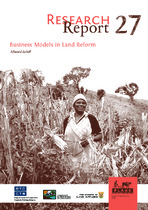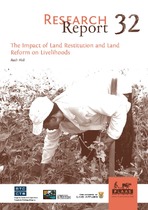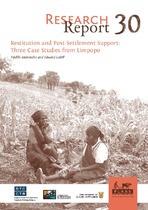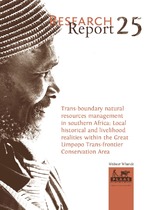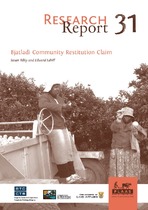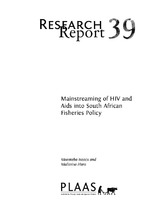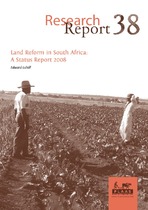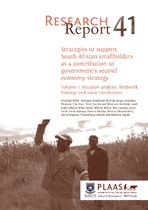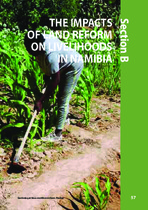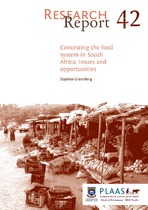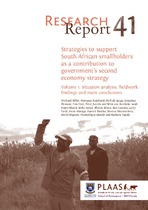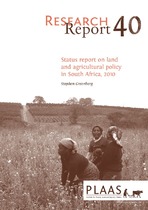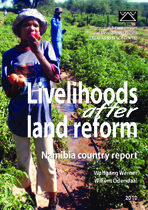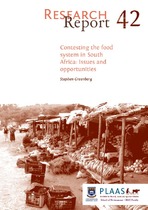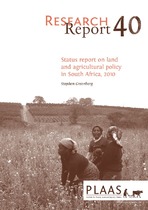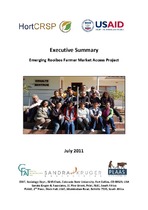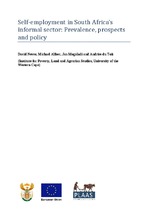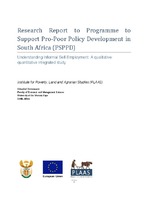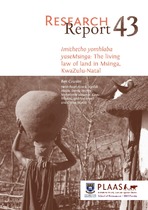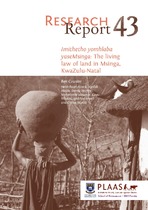Browsing Research Reports by Issue Date
Now showing items 41-60 of 94
-
Business models in land reform
(PLAAS, University of the Western Cape, 2007-08)This paper reviews the types of business models, or landuse models, being implemented in land reform projects involving the transfer of rural land to communities and other groups in South Africa, under both the restitution ... -
The impact of land restitution and land reform on livelihoods
(PLAAS, University of the Western Cape, 2007-08)This report investigates emerging trends evident in the limited literature available on the impact of land restitution on livelihoods, and suggests ways of thinking about, and planning for, livelihoods. The report has ... -
Restitution and post-settlement support: Three case studies from Limpopo
(PLAAS, University of the Western Cape, 2007-08) -
Trans-boundary natural resources management in Southern Africa: Local historical and livelihood realities within the Great Limpopo Trans-frontier Conservation Area
(PLAAS, University of the Western Cape, 2007-08)The end of apartheid rule in South Africa, together with the termination of the civil war in Mozambique and the occupation of Namibia by South Africa in the early 1990s, seemed to herald profound changes in international ... -
Bjatladi community restitution claim
(PLAAS, University of the Western Cape, 2007-08)This report focuses on the restitution case of the Bjatladi Communal Property Association (CPA) and the development and use of the land that has been restored to it in terms of the restitution programme. It examines ... -
Mainstreaming of HIV and Aids into South African fisheries policy
(Institute for Poverty, Land and Agrarian Studies, University of the Western Cape, 2008)HIV/Aids is one of the most serious health, economic and social issues facing southern Africa today (UNAIDS; Heywood 2004). Although only 10% of the world’s population lives in Sub-Saharan Africa, 64% of the 39.5 million ... -
Land reform in South Africa: A status report 2008
(Institute for Poverty, Land and Agrarian Studies, University of the Western Cape, 2008)After 14 years of democracy in South Africa, there is agreement across the political and social spectrum that the state’s programme of land reform is in severe difficulties. Almost since its inception, the programme ... -
Strategies to support South African smallholders as a contribution to government’s second economy strategy. Volume 1: Situation analysis, fieldwork findings and main conclusions
(PLAAS, University of the Western Cape, 2009)Within the ambit of the Accelerated and Shared Growth Initiative of South Africa, government is leading a process to define a Second Economy Strategy, and has identified the agricultural sector as a site of opportunity, ... -
Livelihoods after land reform: The impacts of land reform on livelihoods in Namibia: Section B
(Institute for Poverty, Land and Agrarian Studies, University of the Western Cape, 2010)The first AALS farmers in Hardap obtained their land in 1992, and the most recent in 2003. In Omaheke, the first AALS farmer obtained his farm in 1992 and the most recent, a woman, in 2000. Thus in both regions the oldest ... -
Contesting the food system in South Africa: Issues and opportunities
(Institute for Poverty, Land and Agrarian Studies, University of the Western Cape, 2010)Rising food prices have become a growing concern globally and in southern Africa. In South Africa, where food availability is not an issue at present, the response has been to try to improve access to food, mostly ... -
Strategies to support South African smallholders as a contribution to government’s second economy strategy: Volume 1: Situation analysis, fieldwork findings and main conclusions
(Institute for Poverty, Land and Agrarian Studies, University of the Western Cape, 2010)Within the ambit of the Accelerated and Shared Growth Initiative of South Africa, government is leading a process to define a Second Economy Strategy. One of the opportunities that has been identified is the agricultural ... -
Status report on land and agricultural policy in South Africa, 2010
(Institute for Poverty, Land and Agrarian Studies, University of the Western Cape, 2010)Agriculture plays numerous roles in society. The most obvious is to produce food (and, to a lesser extent, fibre). While agriculture is the mainstay of the rural economy, it also shapes social relations and landscapes. ... -
Livelihoods after land reform
(Institute for Poverty, Land and Agrarian Studies, University of the Western Cape, 2010)In 1990, Namibia emerged from colonial rule with a skewed distribution of agricultural land and high levels of poverty. The new government led by SWAPO Party initiated a process to address the land question within the ... -
Contesting the food system in South Africa: issues and opportunities
(Institute for Poverty, Land and Agrarian Studies, University of the Western Cape, 2010)This report widens the debate about food production and distribution in South Africa to consider some of the entrenched power dynamics that shape the way these happen, and to consider whether a more radical transformation ... -
Status report on land and agricultural policy in South Africa
(PLAAS, University of the Western Cape, 2010)A strategy that seeks to insert smallholders into the large-scale, industrial, export-oriented model can only succeed in broadening and diversifying the producer base slightly. The large-scale model also brings ... -
Emerging rooibos farmer market access project
(Institute for Poverty, Land and Agrarian Studies, University of the Western Cape, 2011)Global markets increasingly require rapid and coordinated response to standards and certification. Yet despite broad political transformations in post‐Apartheid South Africa, structural power relations limit emerging farmer ... -
Self-employment in South Africa’s informal sector: Prevalence, prospects and policy
(Institute for Poverty, Land and Agrarian Studies, University of the Western Cape, 2011)This text describes research undertaken to investigate small-scale self-employment at the margins of the South African economy. Despite high levels of poverty and unemployment South Africa’s informal sector is, by ... -
Research Report to Programme to Support Pro-Poor Policy Development in South Africa (PSPPD)
(Institute for Poverty, Land and Agrarian Studies, University of the Western Cape, 2011)This report documents research conducted on small-scale informal self-employment at the margins of the South African economy. Despite high levels of poverty and unemployment South Africa has, by developing country ... -
Imithetho yomhlaba yaseMsinga: The living law of land in Msinga, KwaZulu-Natal
(Institute for Poverty, Land and Agrarian Studies, University of the Western Cape, 2011)This report describes the ‘living law’ of land in one part of Msinga, a deep rural area of KwaZulu-Natal. It presents research findings from the Mchunu and Mthembu tribal areas, where a three-year action-research ... -
Imithetho yomhlaba yaseMsinga: The living law of land in Msinga, KwaZulu-Natal
(PLAAS, University of the Western Cape, 2011)This report describes the ‘living law’ of land in one part of Msinga, a deep rural area of KwaZulu-Natal. It presents research findings from the Mchunu and Mthembu tribal areas, where a three-year action-research project ...

